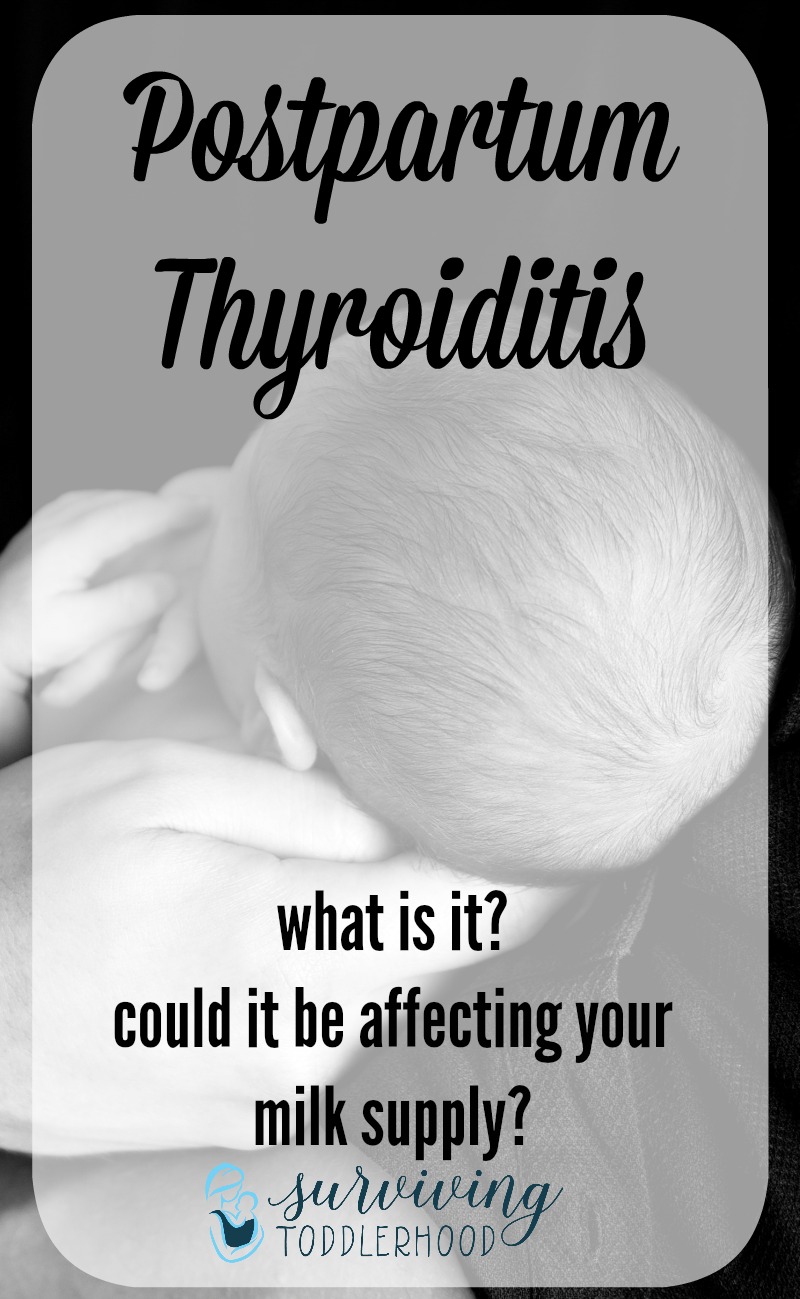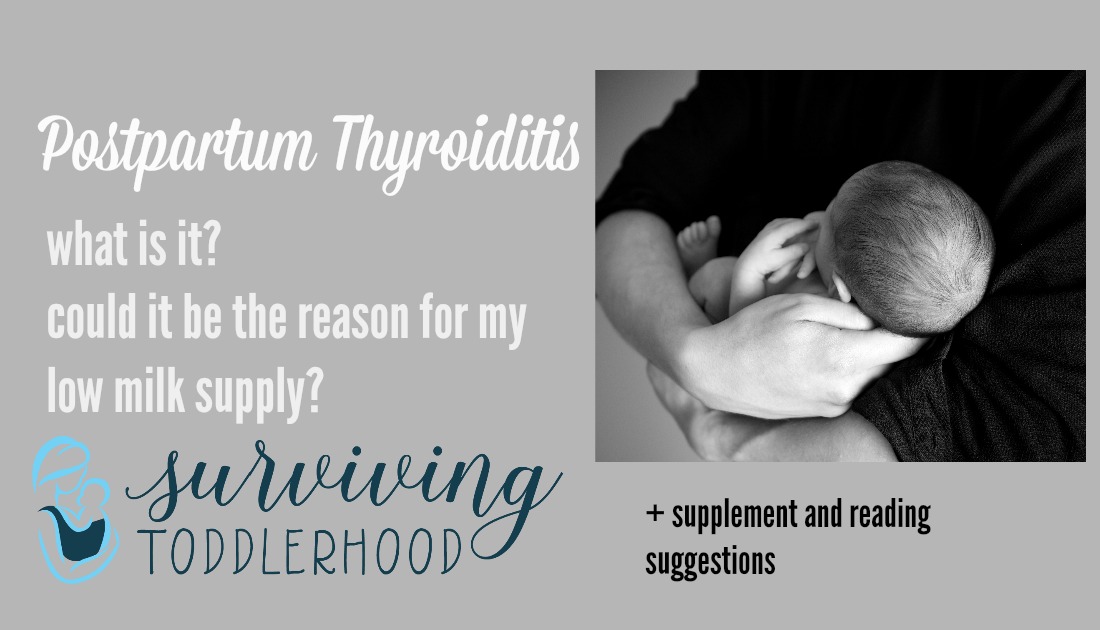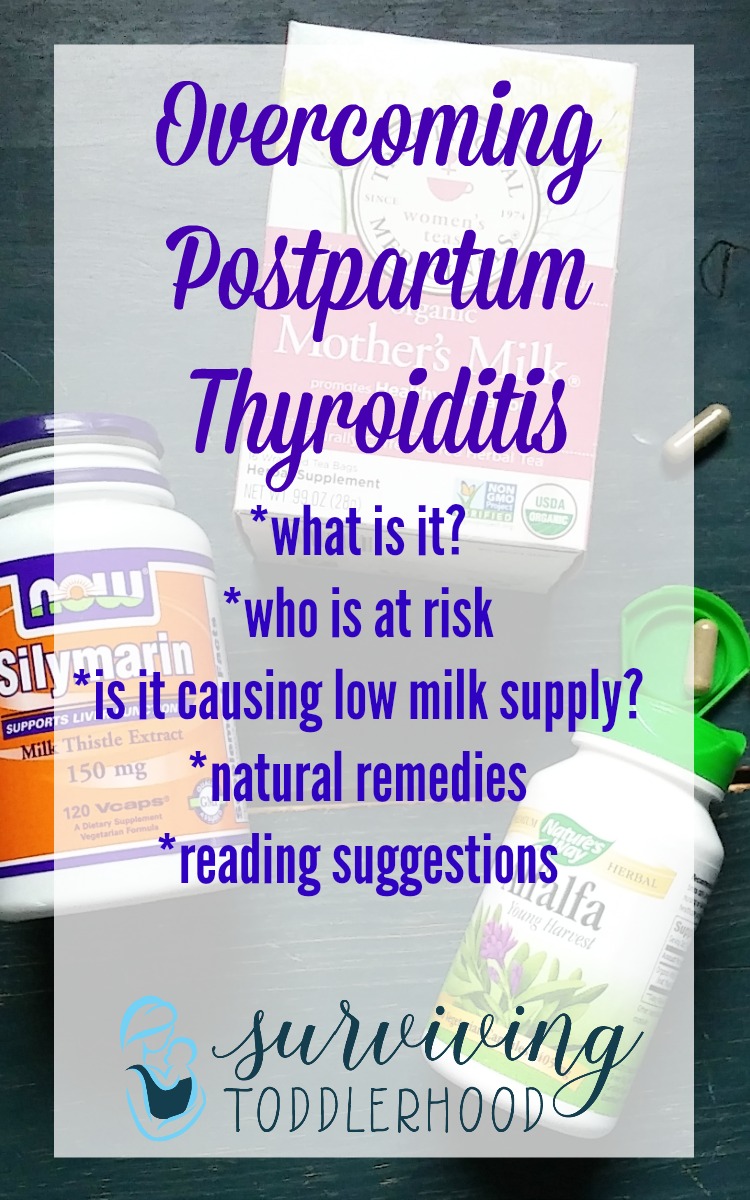{This post contains affiliate links. Read the full disclosure here.}
Last week on Instagram I shared a little bit about my journey through Postpartum Thyroiditis after the birth of my second son, Cameron. Today I want to share some more with you about that journey, including things that I found to help, and how I think I avoided Postpartum Thyroiditis after Andrew’s birth last year.
During pregnancy with both Seth and Cameron my TSH,, T3, T4, and Thyroglobulin Antibodies or Thyroid Peroxidase Antibodies {we alternated testing them} were tested every 6-8 weeks. Most levels were in the normal range for the pregnancies except for my antibody levels which are always a little high because of the Hashimotos.
Cameron’s birth was my first VBAC and it went very well. I have known that I have hypothyroidism and Hashimoto’s since I was 16, and I had controlled it, at that point, with diet and homeopathic/natural remedies. Around 6-8 weeks postpartum I noticed a dip in supply, I started drinking mother’s milk tea because I had found that useful when I had supply dips with Seth, but for all the tea I was drinking I wasn’t noticing that my supply was getting any better, in fact it seemed to be getting worse. The day I realized that I needed to do something different was one that found me with a hungry and crying baby, who seemed inconsolable, at least to me. He would try to nurse and when he wasn’t getting the letdown he was used to, he became frustrated.
That night I searched online for supplements, tinctures, herbs, anything that might help. I also started researching why this was happening, I finally came to the conclusion that it had something to do with my thyroid, at that point I thought I was still hypo, but the low supply was in fact because I was in hyper stage.
I found a tincture called More Milk Plus and had it shipped overnight to my house. I took the maximum dose for several days and it did help to bring my supply back up to normal levels. I was also taking alfalfa tablets and milk thistle along with the tincture. In order to keep my supply up I had to stay on the tincture and supplements for at least two months, then I slowly weaned myself off them.

How Postpartum Thyroiditis Affected My Breastfeeding Relationship
I didn’t realize how much the low milk supply was affecting my nursing relationship with Cameron until later, but I was constantly worrying about supply and if he was getting enough for at least two months. I was paranoid if I forgot a dose of the More Milk Plus tincture, I even carried it around in my purse.
Stress can cause low milk supply so while I won’t know if the low milk supply was from the hyperthyroid stage of Postpartum Thyroiditis or if it was partly from the stress and anxiety and worry, I will be better prepared in the future because I have dealt with this before, and hopefully, in turn, be less worried and stressed.
My story of #postpartum thyroiditis and how it affected #breastfeeding #hashimotos + #autoimmune Click To TweetWhat is Postpartum Thyroiditis?
This disease is diagnosed when the thyroid becomes inflammed in the first year after childbirth. The mother may have hyperthyroidism, hypothyroidism, or both- one right after the other.
How Does Postpartum Thyroiditis Act?
Postpartum thyroiditis can manifest itself in two different ways during the first year postpartum. It can, and in most women does, start with a stage of hyperthyroidism, which can last for a few months before going the opposite way and becoming hypo. The second stage of hypothyroidism usually is resolved around 18 months postpartum. A small number of women find that they struggle with hypothyroidism for the rest of their lives.
In rare cases Postpartum Thyroiditis can manifest with hypothyroidism first and then go into a stage of hyperthyroidism.
If you have Postpartum Thyroiditis once you have a slightly higher chance of having it again during a postpartum period.
Who is at risk for Postpartum Thyroiditis?
Women who are at the most risk for having postpartum thyroiditis are those who:
- have elevated thyroid antibodies during pregnancy
- have been diagnosed with Hashimotos
- have another autoimmune disease
- have a family history of thyroid disease
- have previously had postpartum thyroiditis
The symptoms of hyperthyroidism are:
- Unexplained weight loss
- Rapid heart beat
- Hyperactivity
- Excessive sweating
- Heat intolerance
- Mood swings
- Insomnia
- Difficulty falling asleep
- Diarrhea
- Hair loss
- Excessive hunger
Looking back at these symptoms now I realize that what I thought was a normal recovery from a vaginal birth and breastfeeding- the feelings of being able to accomplish everything, more energy, quick postpartum weight loss, and hunger- were signs that body was struggling and needed help.

I started experiencing symptoms of hypothyroidism again around nine months and then I made an appointment to see an endocrinologist. I was able to see him within a couple of weeks and he was shocked at my TSH results, which if I remember correctly were over 30, he actually told me that I shouldn’t be driving at that point, he was afraid that I could black out with no warning. I decided to start some Levothyroxine to help get things back under control a little faster and it did help, after a month and a half I weaned myself off it and stuck to a very controlled diet- gluten free, dairy free, and sugar free. I did try to avoid most grains but allowed myself oatmeal and the pseudo cereals quinoa and buckwheat.
Symptoms of hypothyroidism include:
- feeling cold, cold extremities
- unexplained weight gain
- hair loss
- mood swings
- low libido
- irregular uterine bleeding
- slower heart rate
- brittle nails
- constipation
After the month and a half of Levothyroxine I switched back to my normal homeopathic and alternative thyroid supplements, that plus controlled diet brought and kept my numbers back in the “normal” range. Scroll down for natural remedies and reading suggestions + how I believe I avoided PPT a second time.
What I Learned on My Journey through Postpartum Thyroiditis
Here are some quick points of things that I learned on the crazy journey through postpartum thyroiditis:
- your body was created to send out distress signals when things aren’t going right, I didn’t notice those signals until it affected my milk supply and in turn my baby’s health
- there are many great things out there that CAN help milk supply, but just because they help one person doesn’t mean that they will help you. You may need to try many different things before you find something that works for you.
- There is a wonderful community of women who are willing to donate their breastmilk to your baby if it is needed. Check out Human Milk for Human Babies and Eats on Feets. Thankfully I never needed to use this amazing resource but know that it is available for you if you need it.
- You can still nurse your baby through your struggles with Postpartum Thyroiditis, the amount of thyroid medicines that pass through breastmilk is very small and your baby won’t be affected by it.
- Low milk supply can be caused by BOTH hyperthyroidism and hypothyroidism.
How I Believe that I avoided getting Postpartum Thyroiditis a second time.
After my first journey through this inflammatory thyroid disease I started researching ways to avoid it in the future. One thing that I found of interest was placental encapsulation. I haven’t read anything that points to placental encapsulation helping one to avoid postpartum thyroidits but the reason I wanted to try it was because I would be putting my own hormones back into my body. During pregnancy your body stores hormones in the placenta and my hope was that because my thyroid was under control during pregnancy those same hormones would be in the placenta and I would be able to balance out what might happen when my thyroid want wacky again. So I tried it. And it was helpful! After birth and when my body was trying to regulate hormones, putting me on crazy mood swings, if I noticed I was becoming angry or stressed I would take a pill. Within twenty to thirty minutes I would feel more calm and in control. I truly believe that taking my placenta pills helped me to avoid postpartum thyroiditis a second time. I will be doing it with any other births that I have as well.
Also, I tried to stay on my regulated diet. Since autoimmune diseases begin in the gut where over 70% of your immune system is I tried my best to take care of my gut microbiome with a soil based probiotic, and avoiding the foods that I am sensitive to.
Supplements that Helped My Milk Supply + Books I Found Helpful
The Breastfeeding Mother’s Guide to Making More Milk
Resources:
Maternal Autoimmune Disorders and Breastfeeding
Breastfeeding and Postpartum Thyroiditis
The Impact of Thyroid Dsyfunction on Lactation


Wow! I was not familiar with postpartum thyroiditis until now! Very informative and so good that you shared. I haven’t heard any women talk about this so it may be something more women should be aware of.
Thanks, Ashley! It isn’t talked about much at all and it can affect between 5% and 7% of women in the first year postpartum. Mommas should definitely know the risks factors so they can keep an eye on things.
Thank you for sharing this!!! I think I had a mild case….started losing a ton of hair, low milk supply and definitely mood swings. I’m wondering if my thyroid levels are off…my nails are so brittle right now and I feel so lethargic this week. This couldn’t have come at a better time! Thank you! xx
Emily | happilylindsey.com
You are welcome!! I hope that you can find some answers soon, Emily! How far postpartum are you?
Thank you for sharing this. I need to get my levels checked. .
Hopefully you can find a doc who will draw the labs for you. I have a hard time finding someone who will do all the tests I want. I finally found an endo that I like and he retired after the second appointment I had with him. 🙁 I’m pretty sure I wasn’t the reason though, haha!
Do you struggle with thyroid issues?
Is it normal for pregnancy/breastfeeding to change your thyroid levels? The other week when I sent you a PM on Facebook, I mentioned that I was feeling exhausted and over-emotional. That’s not normal for me and there weren’t any obvious causes for it. I already told somebody else that I’d have my thyroid checked if it happened again, but I didn’t think it would be that drastic of a change.
How far postpartum are you? Pregnancy can effect your thyroid levels but I don’t think breastfeeding itself can. Were you ovulating at the time. Some women find that can affect their energy and emotions, because of the changes in hormones then.
Are you having any of the other symptoms of thyroid disorders?
It’s been a year already. I can’t track my cycle at all right now. I’m on norethidrone so it keeps my hormones screwed up. My family has both thyroid disorders, so that’s always the first thing we check. I do feel like I’m lacking in energy a lot, but it’s hard to tell when I have a reason for that as a Mom or if there’s something else going on. I’ve never felt exhausted like that though.
I would definitely look into adrenal fatigue and Hashimotos then. Your adrenals, liver, thyroid, and gut all work in conjunction with one another and if one is off than they can all be off. Or you may have one off right now that can be stressing the others even though it isn’t showing up in your thyroid tests yet. And you can also have Hashimotos even with normal thyroid results.